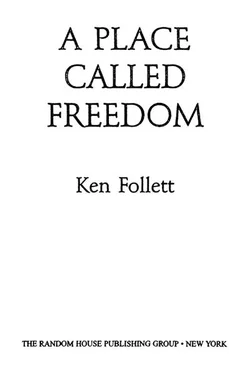Ken Follett - A Place Called Freedom (1995)
Здесь есть возможность читать онлайн «Ken Follett - A Place Called Freedom (1995)» весь текст электронной книги совершенно бесплатно (целиком полную версию без сокращений). В некоторых случаях можно слушать аудио, скачать через торрент в формате fb2 и присутствует краткое содержание. Жанр: Исторический детектив, на английском языке. Описание произведения, (предисловие) а так же отзывы посетителей доступны на портале библиотеки ЛибКат.
- Название:A Place Called Freedom (1995)
- Автор:
- Жанр:
- Год:неизвестен
- ISBN:нет данных
- Рейтинг книги:4 / 5. Голосов: 1
-
Избранное:Добавить в избранное
- Отзывы:
-
Ваша оценка:
- 80
- 1
- 2
- 3
- 4
- 5
A Place Called Freedom (1995): краткое содержание, описание и аннотация
Предлагаем к чтению аннотацию, описание, краткое содержание или предисловие (зависит от того, что написал сам автор книги «A Place Called Freedom (1995)»). Если вы не нашли необходимую информацию о книге — напишите в комментариях, мы постараемся отыскать её.
A Place Called Freedom (1995) — читать онлайн бесплатно полную книгу (весь текст) целиком
Ниже представлен текст книги, разбитый по страницам. Система сохранения места последней прочитанной страницы, позволяет с удобством читать онлайн бесплатно книгу «A Place Called Freedom (1995)», без необходимости каждый раз заново искать на чём Вы остановились. Поставьте закладку, и сможете в любой момент перейти на страницу, на которой закончили чтение.
Интервал:
Закладка:
The reply had come yesterday, and it was the most exciting thing that had ever happened to Mack. It would change his life beyond recognition, he thought. It might set him free.
As far back as he could remember he had longed to be free. As a child he had envied Davey Patch, who roamed from village to village selling knives and string and ballads. What was so wonderful about Davey’s life, to the child Mack, was that he could get up at sunrise and go to sleep when he felt tired. Mack, from the age of seven, had been shaken awake by his mother a few minutes before two o’clock in the morning and had worked down the mine for fifteen hours, finishing at five o’clock in the afternoon; then had staggered home, often to fall asleep over his evening porridge.
Mack no longer wanted to be a peddler, but he still yearned for a different life. He dreamed of building a house for himself, in a valley like High Glen, on a piece of land he could call his own; of working from dawn to dusk and resting all the hours of darkness; of the freedom to go fishing on a sunny day, in a place where the salmon belonged not to the laird but to whoever caught them. And the letter in his hand meant that his dreams might come true.
“I’m still not sure you should read it aloud in church,” Esther said as they tramped across the frozen mountainside.
Mack was not sure either, but he said: “Why not?”
“There’ll be trouble. Ratchett will be furious.” Harry Ratchett was the viewer, the man who managed the mine on behalf of the owner. “He might even tell Sir George, and then what will they do to you?”
He knew she was right, and his heart was full of trepidation. But that did not stop him arguing with her. “If I keep the letter to myself, it’s pointless,” he said.
“Well, you could show it to Ratchett privately. He might let you leave quietly, without any fuss.”
Mack glanced at his twin out of the corner of his eye. She was not in a dogmatic frame of mind, he could tell. She looked troubled rather than combative. He felt a surge of affection for her. Whatever happened, she would be on his side.
All the same he shook his head stubbornly. “I’m not the only one affected by this letter. There’s at least five lads would want to get away from here, if they knew they could. And what about future generations?”
She gave him a shrewd look. “You may be right—but that’s not the real reason. You want to stand up in church and prove the mine owner wrong.”
“No, I don’t!” Mack protested. Then he thought for a moment and grinned. “Well, there may be something in what you say. We’ve heard so many sermons about obeying the law and respecting our betters. Now we find that they’ve been lying to us, all along, about the one law that affects us most. Of course I want to stand up and shout it aloud.”
“Don’t give them reason to punish you,” she said worriedly.
He tried to reassure her. “I’ll be as polite and humble as can be,” he said. “You’ll hardly recognize me.”
“Humble!” she said skeptically. “I’d like to see that.”
“I’m just going to say what the law is—how can that be wrong?”
“It’s incautious.”
“Aye, that it is,” he conceded. “But I’m going to do it anyway.”
They crossed a ridge and dropped down the far side, back into Coalpit Glen. As they descended, the air became a little less cold. A few moments later the small stone church came into view, beside a bridge over the dirty river.
Near the churchyard clustered a few crofters’ hovels. These were round huts with an open fire in the middle of the earth floor and a hole in the roof to let the smoke out, the one room shared by cattle and people all winter. The miners’ houses, farther up the glen near the pits, were better: though they, too, had earth floors and turf roofs, every one had a fireplace and a proper chimney, and glass in the little window by the door; and miners were not obliged to share their space with cows. All the same the crofters considered themselves free and independent, and looked down on the miners.
However, it was not the peasants’ huts that now arrested the attention of Mack and Esther and brought them up short. A closed carriage with a fine pair of grays in harness stood at the church porch. Several ladies in hooped skirts and fur wraps were getting out, helped by the pastor, holding on to their fashionable lacy hats.
Esther touched Mack’s arm and pointed to the bridge. Riding across on a big chestnut hunter, his head bent into the cold wind, was the owner of the mine, the laird of the glen, Sir George Jamisson.
Jamisson had not been seen here for five years. He lived in London, which was a week’s journey by ship, two weeks by stagecoach. He had once been a penny-pinching Edinburgh chandler, people said, selling candles and gin from a corner shop, and no more honest than he had to be. Then a relative died young and childless, and George had inherited the castle and the mines. On that foundation he had built a business empire that stretched to such unimaginably distant places as Barbados and Virginia. And he was now starchily respectable: a baronet, a magistrate, and alderman of Wapping, responsible for law and order along London’s waterfront.
He was obviously paying a visit to his Scottish estate, accompanied by family and guests.
“Well, that’s that,” Esther said with relief.
“What do you mean?” said Mack, although he could guess.
“You won’t be able to read out your letter now.”
“Why not?”
“Malachi McAsh, don’t be a damn fool!” she exclaimed. “Not in front of the laird himself!”
“On the contrary,” he said stubbornly. “This makes it all the better.”
2
LIZZIE HALLIM REFUSED TO GO TO CHURCH IN THE carriage. It was a silly idea. The road from Jamisson Castle was a rutted, potholed track, its muddy ridges frozen as hard as rock. The ride would be frightfully bumpy, the carriage would have to go at walking pace, and the passengers would arrive cold and bruised and probably late. She insisted on riding to church.
Such unladylike behavior made her mother despair. “How will you ever get a husband if you always act like a man?” Lady Hallim said.
“I can get a husband whenever I like,” Lizzie replied. It was true: men fell in love with her all the time. “The problem is finding one I can put up with for more than half an hour.”
“The problem is finding one that doesn’t scare easily,” her mother muttered.
Lizzie laughed. They were both right. Men fell in love with her at first sight, then found out what she was like and backed off hurriedly. Her comments had scandalized Edinburgh society for years. At her first ball, talking to a trio of old dowagers, she had remarked that the high sheriff had a fat backside, and her reputation had never recovered. Last year Mother had taken her to London in the spring and “launched” her into English society. It had been a disaster. Lizzie had talked too loud, laughed too much and openly mocked the elaborate manners and tight clothes of the dandified young men who tried to court her.
“It’s because you grew up without a man in the house,” her mother added. “It’s made you too independent.” With that she got into the carriage.
Lizzie walked across the flinty front of Jamisson Castle, heading for the stables on the east side. Her father had died when she was three, so she hardly remembered him. When she asked what killed him her mother said vaguely: “Liver.” He had left them penniless. For years Mother had scraped by, mortgaging more and more of the Hallim estate, waiting for Lizzie to grow up and marry a wealthy man who would solve all their problems. Now Lizzie was twenty years old and it was time to fulfill her destiny.
Читать дальшеИнтервал:
Закладка:
Похожие книги на «A Place Called Freedom (1995)»
Представляем Вашему вниманию похожие книги на «A Place Called Freedom (1995)» списком для выбора. Мы отобрали схожую по названию и смыслу литературу в надежде предоставить читателям больше вариантов отыскать новые, интересные, ещё непрочитанные произведения.
Обсуждение, отзывы о книге «A Place Called Freedom (1995)» и просто собственные мнения читателей. Оставьте ваши комментарии, напишите, что Вы думаете о произведении, его смысле или главных героях. Укажите что конкретно понравилось, а что нет, и почему Вы так считаете.












